Deep and Wide Multiscale Recursive Networks for Robust Image Labeling
Paper and Code
Dec 06, 2013



Feedforward multilayer networks trained by supervised learning have recently demonstrated state of the art performance on image labeling problems such as boundary prediction and scene parsing. As even very low error rates can limit practical usage of such systems, methods that perform closer to human accuracy remain desirable. In this work, we propose a new type of network with the following properties that address what we hypothesize to be limiting aspects of existing methods: (1) a `wide' structure with thousands of features, (2) a large field of view, (3) recursive iterations that exploit statistical dependencies in label space, and (4) a parallelizable architecture that can be trained in a fraction of the time compared to benchmark multilayer convolutional networks. For the specific image labeling problem of boundary prediction, we also introduce a novel example weighting algorithm that improves segmentation accuracy. Experiments in the challenging domain of connectomic reconstruction of neural circuity from 3d electron microscopy data show that these "Deep And Wide Multiscale Recursive" (DAWMR) networks lead to new levels of image labeling performance. The highest performing architecture has twelve layers, interwoven supervised and unsupervised stages, and uses an input field of view of 157,464 voxels ($54^3$) to make a prediction at each image location. We present an associated open source software package that enables the simple and flexible creation of DAWMR networks.
 Add to Chrome
Add to Chrome Add to Firefox
Add to Firefox Add to Edge
Add to Edge